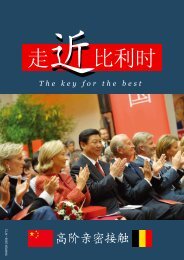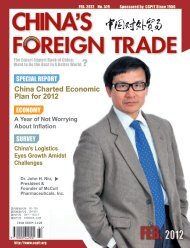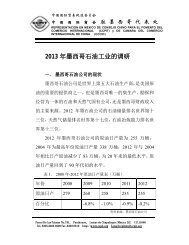F REIGN TRADE - 中国国际贸易促进委员会
F REIGN TRADE - 中国国际贸易促进委员会
F REIGN TRADE - 中国国际贸易促进委员会
You also want an ePaper? Increase the reach of your titles
YUMPU automatically turns print PDFs into web optimized ePapers that Google loves.
terprises and their foreign counterpartswill be encouraged. In the revision of“advantageous industry catalog for foreigninvestments in Central and WestChina”, more entries will be added forthe labor-intensive projects; the foreignfundedenterprises will be encouragedto develop in the central and westernareas the labor-intensive industries inline with requirements for environmentalprotection, and both the domesticenterprises and the foreign counterpartsin the western areas will continueto enjoy the preferential policies forcorporate income tax; more preferentialpolicies as well as technical and capitalsupport will be in place for the foreignfundedenterprises in the eastern regionsto shift to the central and westernregions. All of these will impact theindustrial structure and regional structureof foreign investments.Third, under such circumstance asstabilizing price and controlling housingprice, economic growth has sloweddown and investment cost faces upwardpressure, which dents the influx of foreigninvestmentsWith tight corporate capital chainand increasing risk for economic downside,although the domestic monetarypolicy has got looser this year, thenational economic growth will slowdown due to under high pressure forinflation no fast growth in money supply,persistent policy for housing pricecontrol and slower investment growthin real estate and related industries. Asa result, the time that a couple of yearsago foreign investors capitalized on thehigh housing price to massively nudgeinto the domestic housing sector hasgone. In the mean time, China’s risinglabor cost, high raw material price andRMB appreciation will push up investmentcost, which will inevitably deterthe growth of foreign investments.From the perspective of internationalfactors:First, the world economy isgloomy for recovery and great uncertaintiesexist for economic growth,therefore, foreign investors now becomecautious.In the wake of the financial crisis,the world economy has been strugglingout of the slump, but sluggish. Theunpredictable international politicalenvironment, turbulent situation in theMiddle East and North Africa, chaoticSouth Asia and South China Sea areas,as well as intense battle among big nationsacross the world have made thingsworse for the world economy to step outof the crisis. According to the IMF’sanalysis, the world economic growth in2011 did not live up to the predictionat the beginning of the year, decliningto around 4% from above 5% in 2010;the real GDP in the economic powersremains grim — the real GDP growthwas as low as around 2% in 2011 andthis year the real GDP is forecasted torise 2%. The depressed world economywill necessarily lead to lower enthusiasmand input for the foreign countries toinvest in China, which will be a majorconstraint for attracting inbound FDI.Second, the US economy is in adownturn and its “re-industrialization”strategy impact its investments in China.As the world’s largest economicpower, the US was heavily hit by the2008 financial tsunami with high unemploymentrate and fiscal deficit aswell as slowing economic growth. TheIMF forecasted that this year the USwould still have a high fiscal deficit, accountingfor as high as 6.1% in its GDP.The debt problem will be a mediumandlong-term constraint for the USeconomic recovery. On the one hand,the cap for issuing national bonds needsto be raised so as to avoid debt defaultsand then debt crisis; on the other hand,at the time for presidential election, economicdecline should be avoided, and aloose fiscal policy with higher corporatetax cannot be implemented. Consequently,the debt problem will be a longtermbottleneck for the US and thuseconomic recovery will be very slow.Unemployment is the biggestchallenge confronting the US. TheIMF’s prediction revealed that in 2011the US unemployment rate was 8.8%-9.1% and it would remain as high as8.3%-9% in 2012. In spite of a string ofpro-employment acts that the Obamaadministration has raised, the effects ofthese acts are not satisfactory enough.As a result, unemployment will becomethe biggest obstacle for the US economyto recover.Confronted with so many difficulties,the US economy has seen somegrowth, but it is still in the downturn.The IMF predicted that in 2011 the USGDP growth rate was 1.7%-2.1% andin 2012 it would probably rise to 2.6%-3.3%. Against the backdrop of the US“re-industrialization” strategy to rejuvenateeconomy, China’s inbound foreigninvestments will necessarily sink andeven backflow of some foreign investmentswill resulted.All in all, the US economic trendand its internal policies will become akey factor affecting its investments inChina this year.Third, as the European sovereigndebt crisis escalates, it will be difficultfor the EU economy to recover in ashort period and the EU will be weakerto invest abroad.In 2011, the European sovereigndebt crisis kept spreading, which meantthat the crisis passed on from the peripherycountries including Ireland andGreece to the core EU member countriessuch as Italy, Spain and Portugal.Three international credit rating agencieshave kept downgrading the creditgrade of the EU member countries andeven France, the core member in theEU has no way to be not involved.As the bailout mechanism the EUformulated can only solve the liquidityproblem for the countries trapped bythe crisis in the short run, but cannotimprove their solvency in the real sense,the default risk for these countries ismounting; the EU debt crisis maytransmit to medium- and large-sizedeconomic entities from small-sizedones. In particular, Italy’s debt problemhas tremendous potential risk; theEuropean banking sector, with a 53%asset in the global banking sector, holdsa huge amount of bonds worth morethan EUR 500 billion in the PIIGS(Portugal, Italy, Ireland, Greece andSpain), so there exist risks for the debtcrisis to evolve into a banking crisis. In2012, the EU is very likely to face a difficultyear for addressing the sovereigndebt crisis.The EU is deeply hit by the crisisand has no way to step out of the crisisby itself. The escalation of the Europeansovereign debt crisis this year willimpose persistent impact on the EUeconomy, making it hard to recover ina short time; even if the EU sovereign16

















